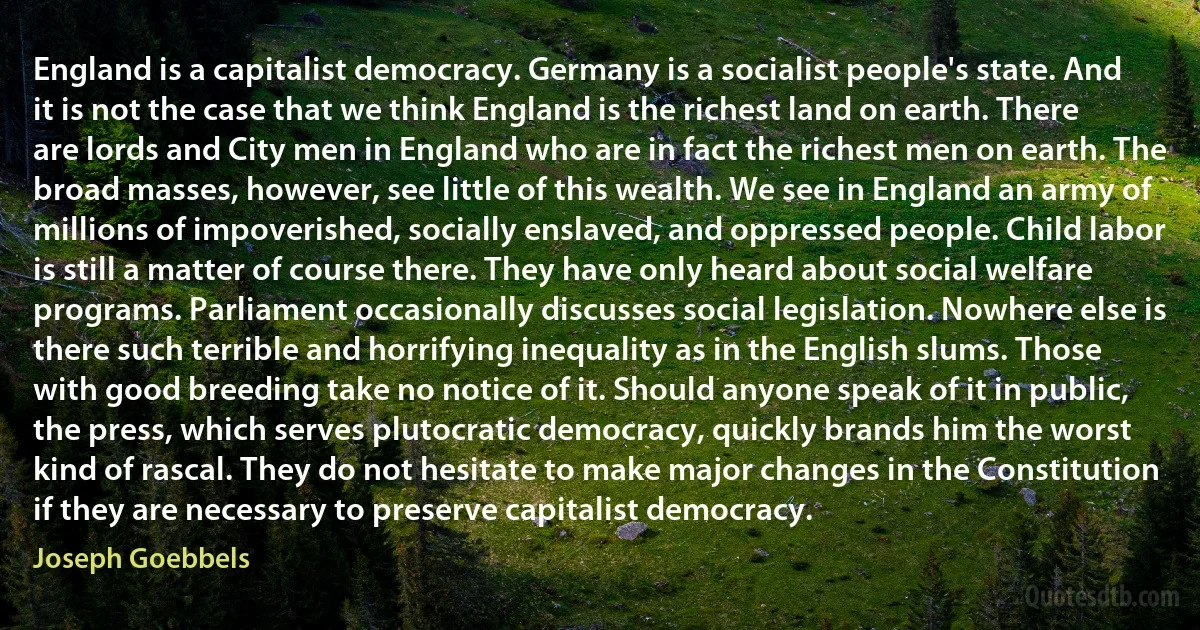
England is a capitalist democracy. Germany is a socialist people's state. And it is not the case that we think England is the richest land on earth. There are lords and City men in England who are in fact the richest men on earth. The broad masses, however, see little of this wealth. We see in England an army of millions of impoverished, socially enslaved, and oppressed people. Child labor is still a matter of course there. They have only heard about social welfare programs. Parliament occasionally discusses social legislation. Nowhere else is there such terrible and horrifying inequality as in the English slums. Those with good breeding take no notice of it. Should anyone speak of it in public, the press, which serves plutocratic democracy, quickly brands him the worst kind of rascal. They do not hesitate to make major changes in the Constitution if they are necessary to preserve capitalist democracy.
Joseph GoebbelsRelated topics
anyone army capitalist case child city course earth english good inequality men kind labor land legislation mass matter necessary notice nowhere people preserve public see should socialist speak state take think wealth worst lordsRelated quotes
After the war, Japan was occupied by the allied forces, and based on peace and democracy as values to be upheld, established the Constitution of Japan, undertook various reforms and built the foundation of Japan that we know today. I have profound gratitude for the efforts made by the Japanese people at the time who helped reconstruct and improve the country devastated by the war. I also feel that we must not forget the help extended to us in those days by Americans with an understanding of Japan and Japanese culture. Today, more than sixty years since the end of the war, we have seen that, in the face of major disasters such as the Great East Japan Earthquake [March 11, 2011], there are so many people in Japan who value the bonds between people, can deal with various situations calmly, and work hard towards reconstruction. I have found this most reassuring.

Akihito
Germany agreed to restrict her Navy to one third the size of the British but was accorded the right to build submarines, explicitly denied her by the peace treaty, up to 60 percent of British strength, and to 100 percent in case she decided it was necessary to her security, which she shortly did. Germany also pledged that her U-boats would never attack unarmed merchant ships, a word that she went back on from the very beginning of the second war. As soon as the deal with Britain was concluded Germany laid down two battleships, the Bismarck and Tirpitz, with a displacement of over 45,000 tons. By the terms of the Washington and London naval accords, Britain, France, Italy, Japan, and the United States had to limit their battleships to 35,000 tons. Great Britain, as the French contended, had no legal right to absolve Germany from respecting the naval clauses of the Versailles Treaty. And, as many Frenchmen added, no moral right either.

William L. Shirer
Our constitution is comparatively a new constitution. It is based largely on the model of the British Constitution. As such it has history if not ancestry, which may well go back to centuries. It is being worked I venture to presume, successfully and to the satisfaction of all concerned although within the short period of 10 years, it has had to undergo not less than 7 amendments...The constitution is largely founded on the British Constitution. There are certain differences which are obvious. The British Constitution is a unitary constitution in which the Parliament is supreme, having no other authority sharing its power of legislation except such as may be delegated. Our constitution is a federal constitution in which the powers and functions of the Union Parliament and the State Legislatures are clearly defined and the one has no power or right to encroach upon the rights and powers reserved to the other.

Rajendra Prasad
The American model – democracy – must be regarded as a historical error, economically as well as morally. Democracy promotes shortsightedness, capital waste, irresponsibility, and moral relativism. It leads to permanent compulsory income and wealth redistribution and legal uncertainty. It is counterproductive. It promotes demagoguery and egalitarianism. It is aggressive and potentially totalitarian internally, vis-à-vis its own population, as well as externally. In sum, it leads to a dramatic growth of state power, as manifested by the amount of parasitically – by means of taxation and expropriation – appropriated government income and wealth in relation to the amount of productively – through market exchange – acquired private income and wealth, and by the range and invasiveness of state legislation. Democracy is doomed to collapse, just as Soviet communism was doomed to collapse.

Hans-Hermann Hoppe
The administrators of the executive power may be either elective or not; and in the former case all or only some of them may be elective. They are elective in a proper democracy, that is to say, in a democracy which recognizes representation. If all the public officials are directly elected by the whole people, the democracy is a pure democracy; if only some, it is a mixed democracy. The public officials may also fill vacancies themselves; this is the case in a pure aristocracy. But if only some of the magistrates are thus replaced by the public officers, and if the others are again directly elected by the people, then the form of government is that of a democratic aristocracy. A permanent president (monarch) may also be elected to exercise the executive power during his lifetime. In all these cases, either all citizens of the commonwealth, or only some of them, are eligible to office. Eligibility may, therefore, be limited or unlimited.

Johann Gottlieb Fichte
